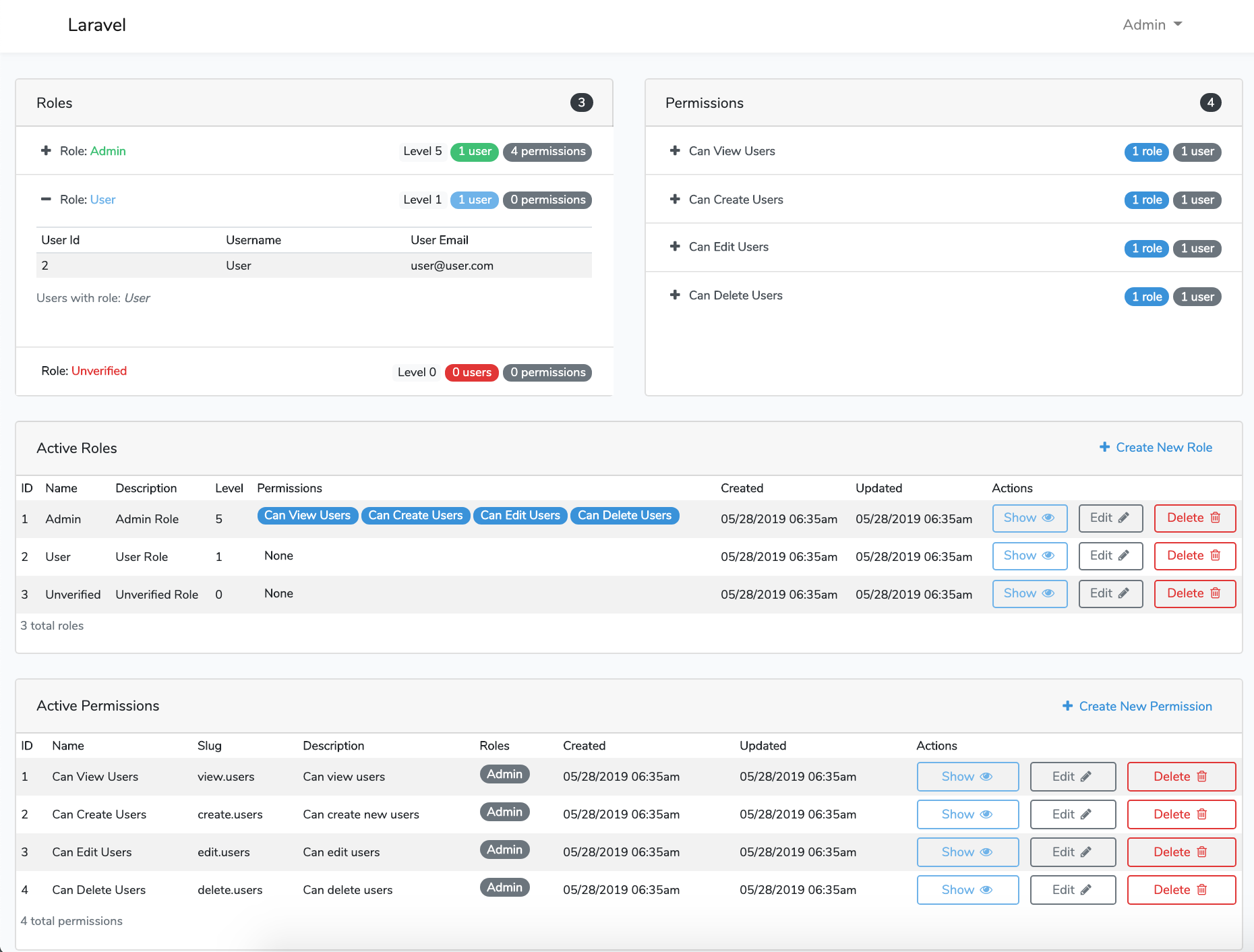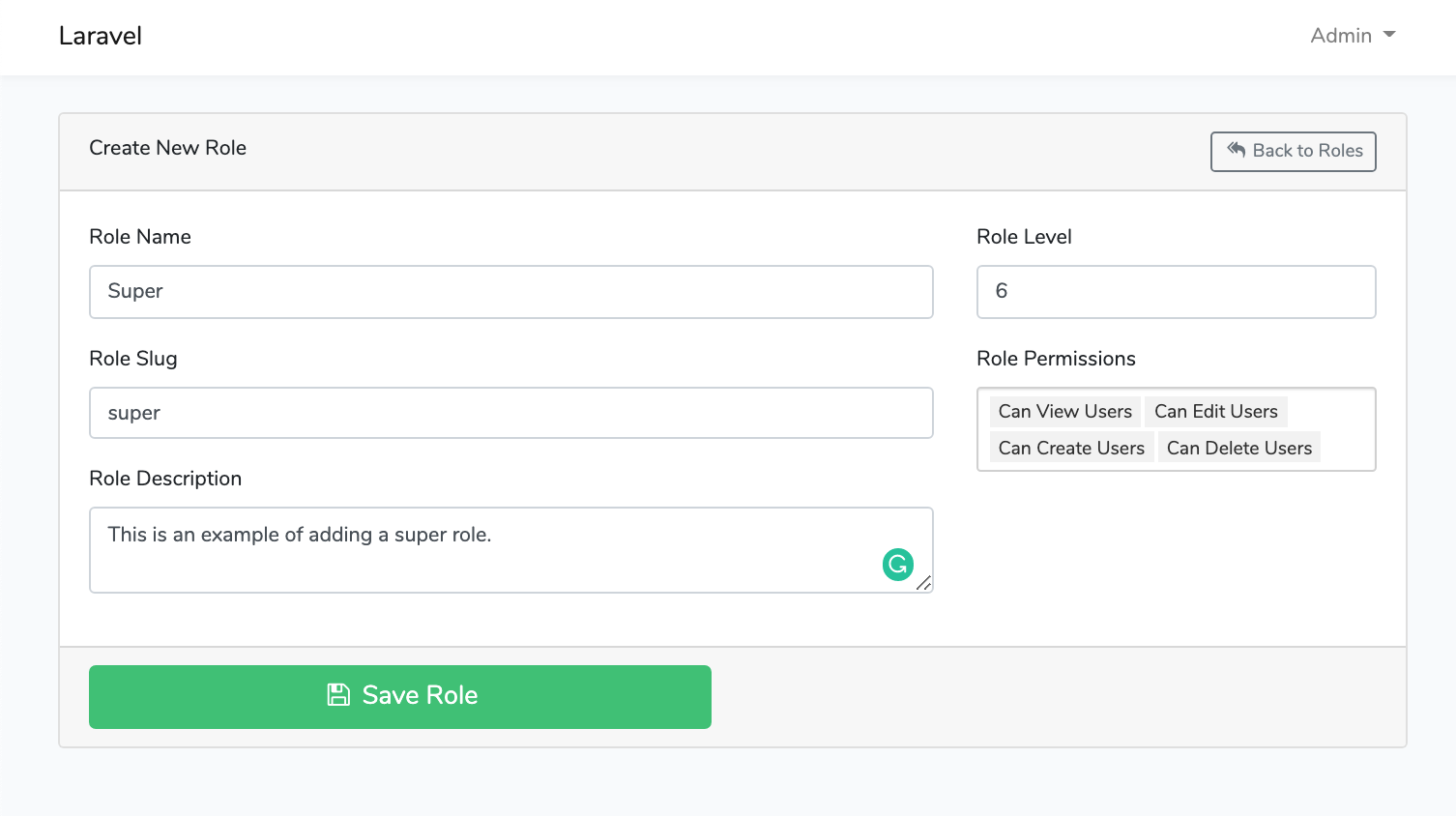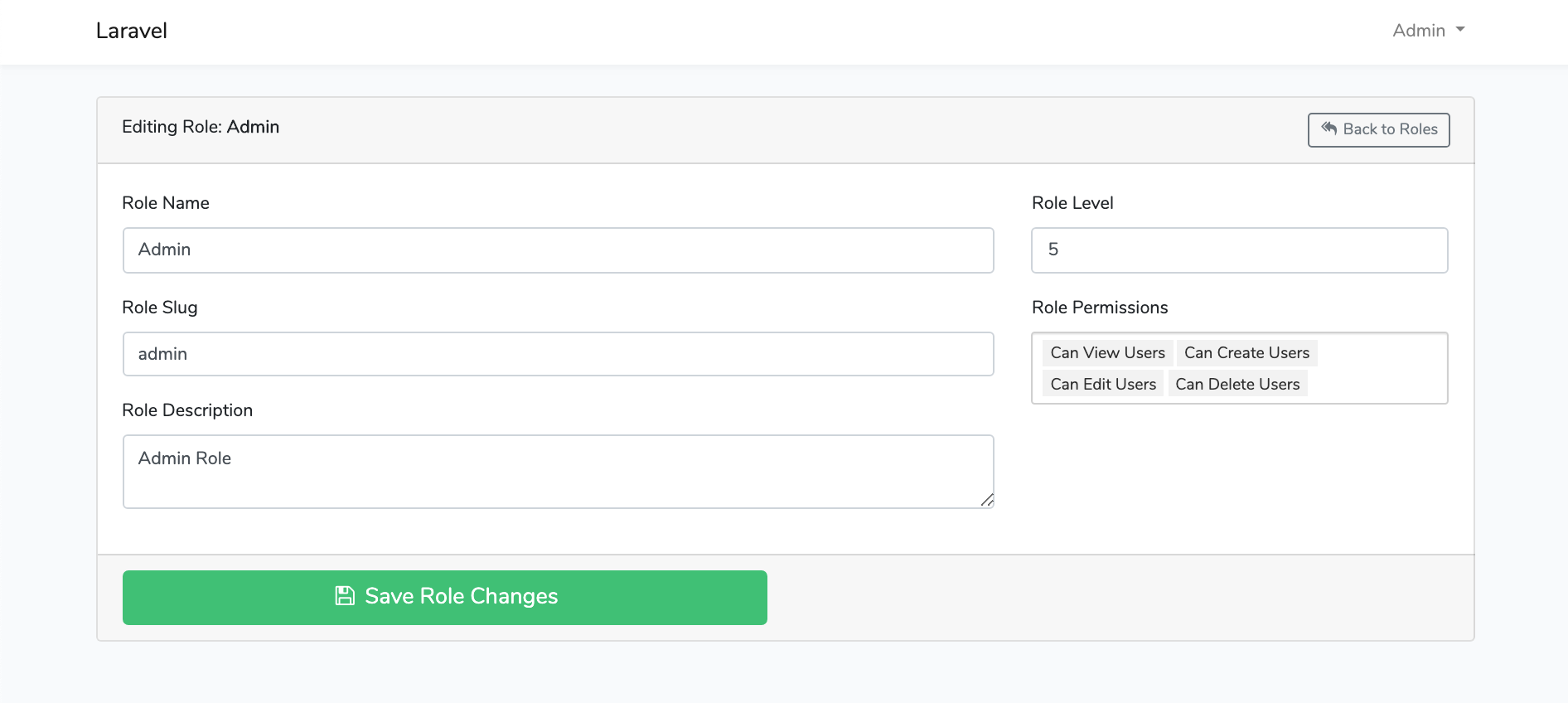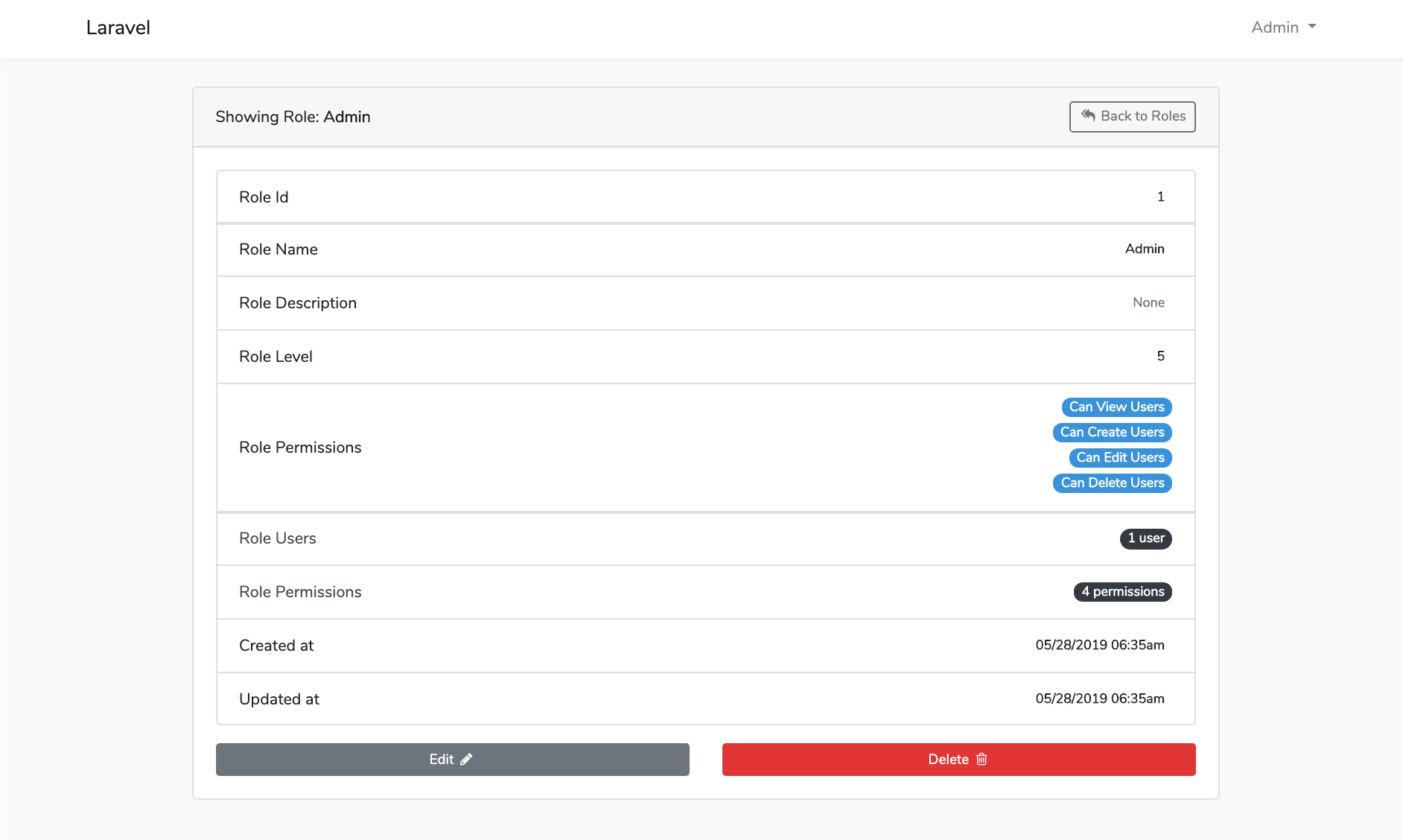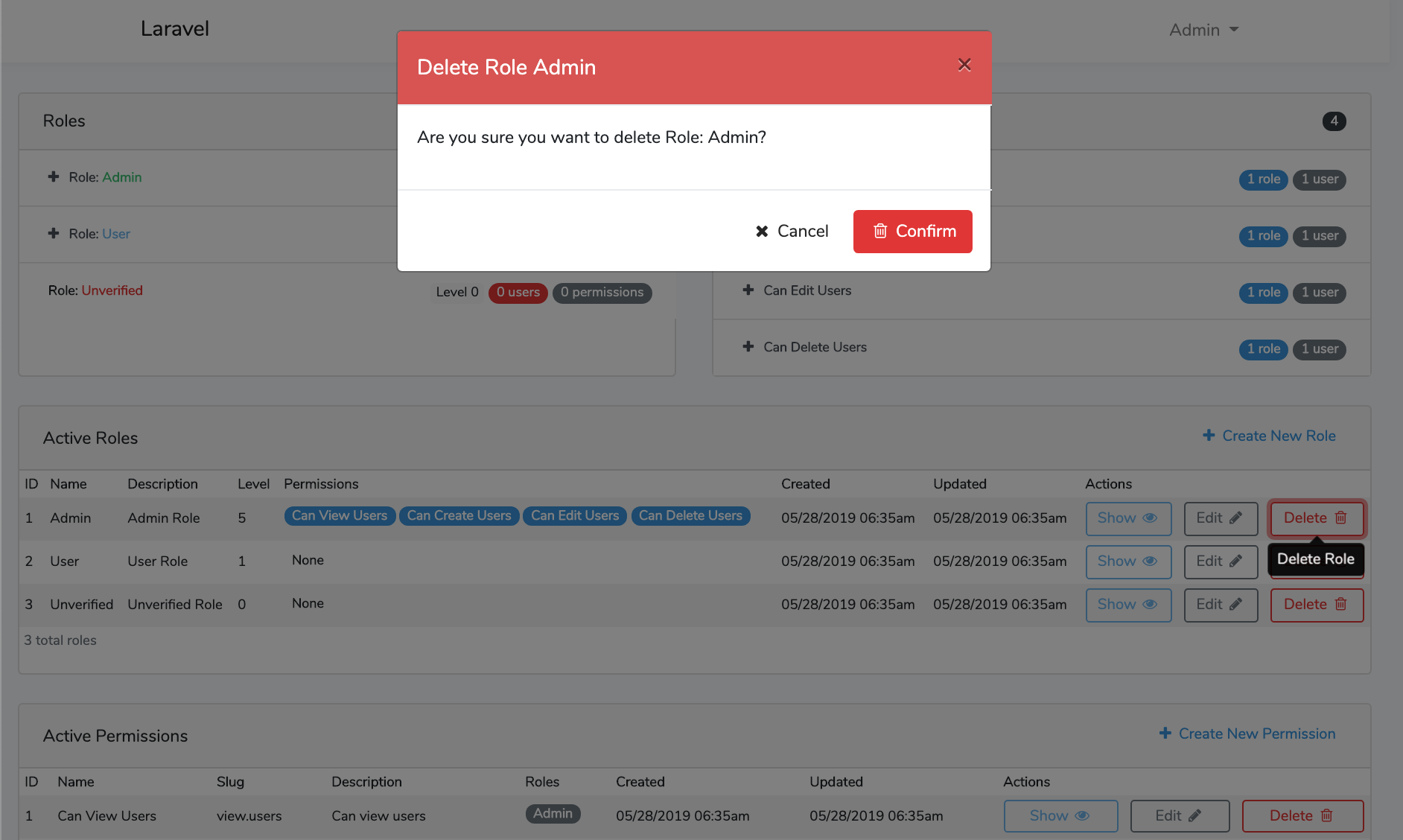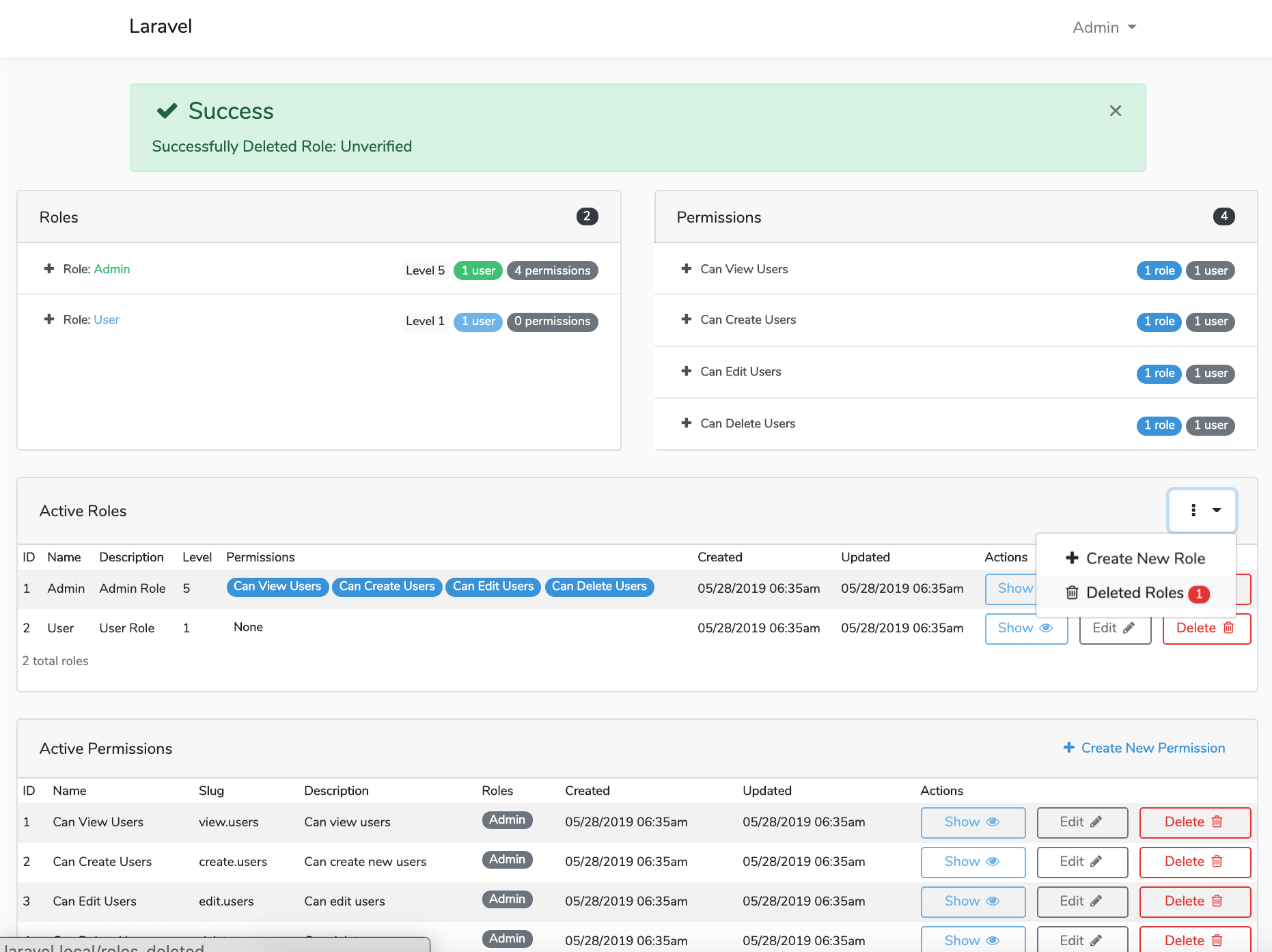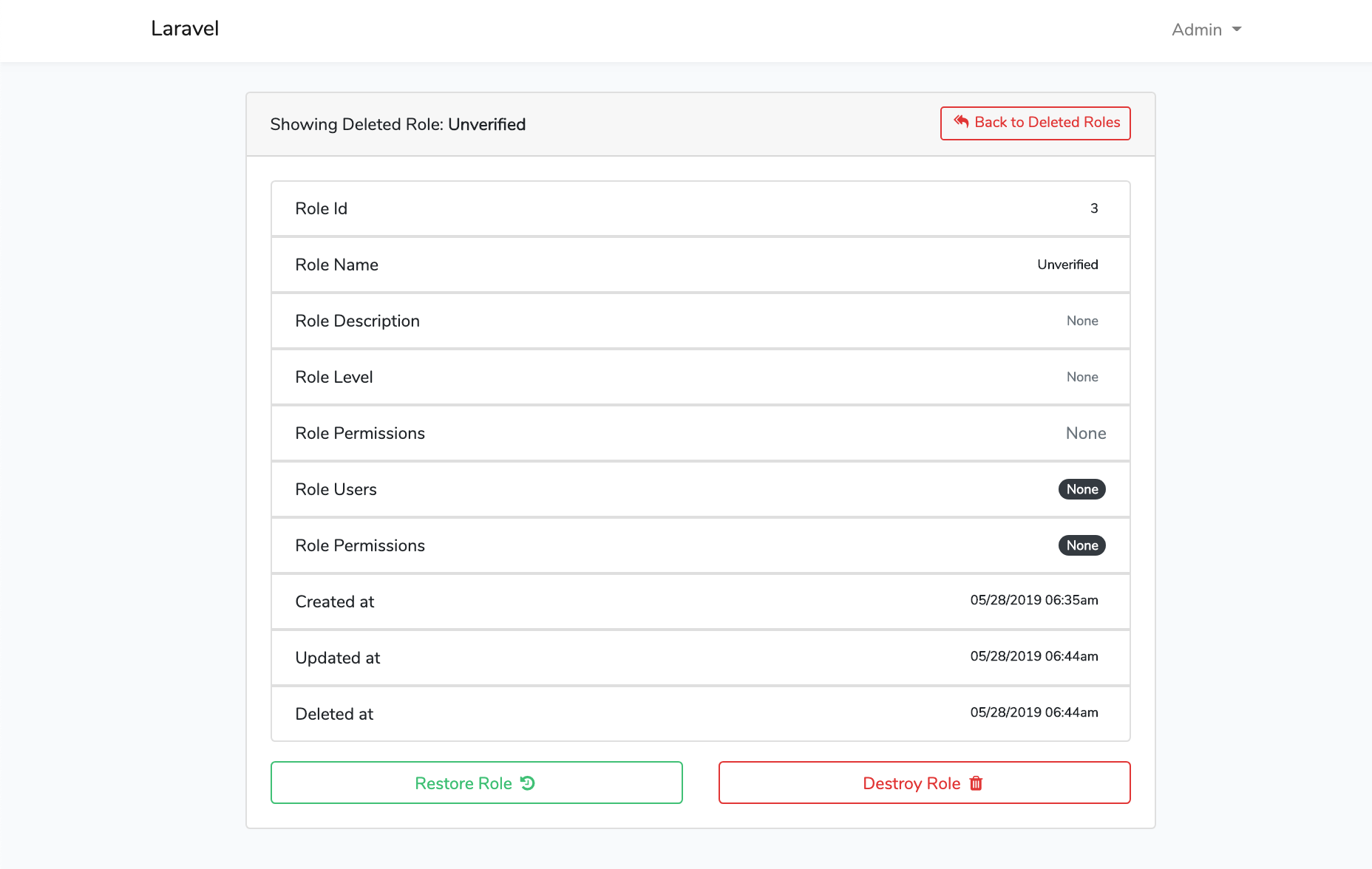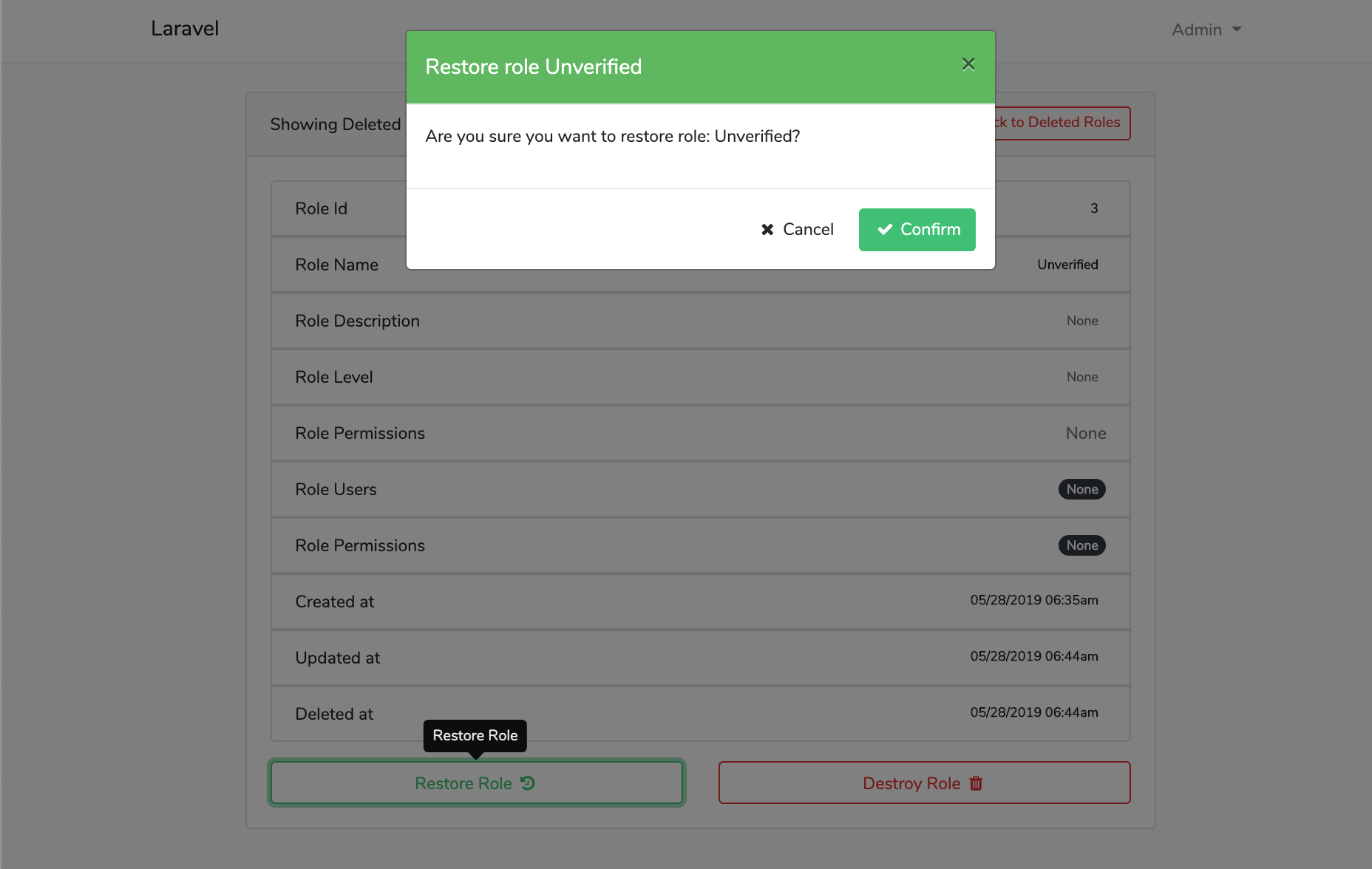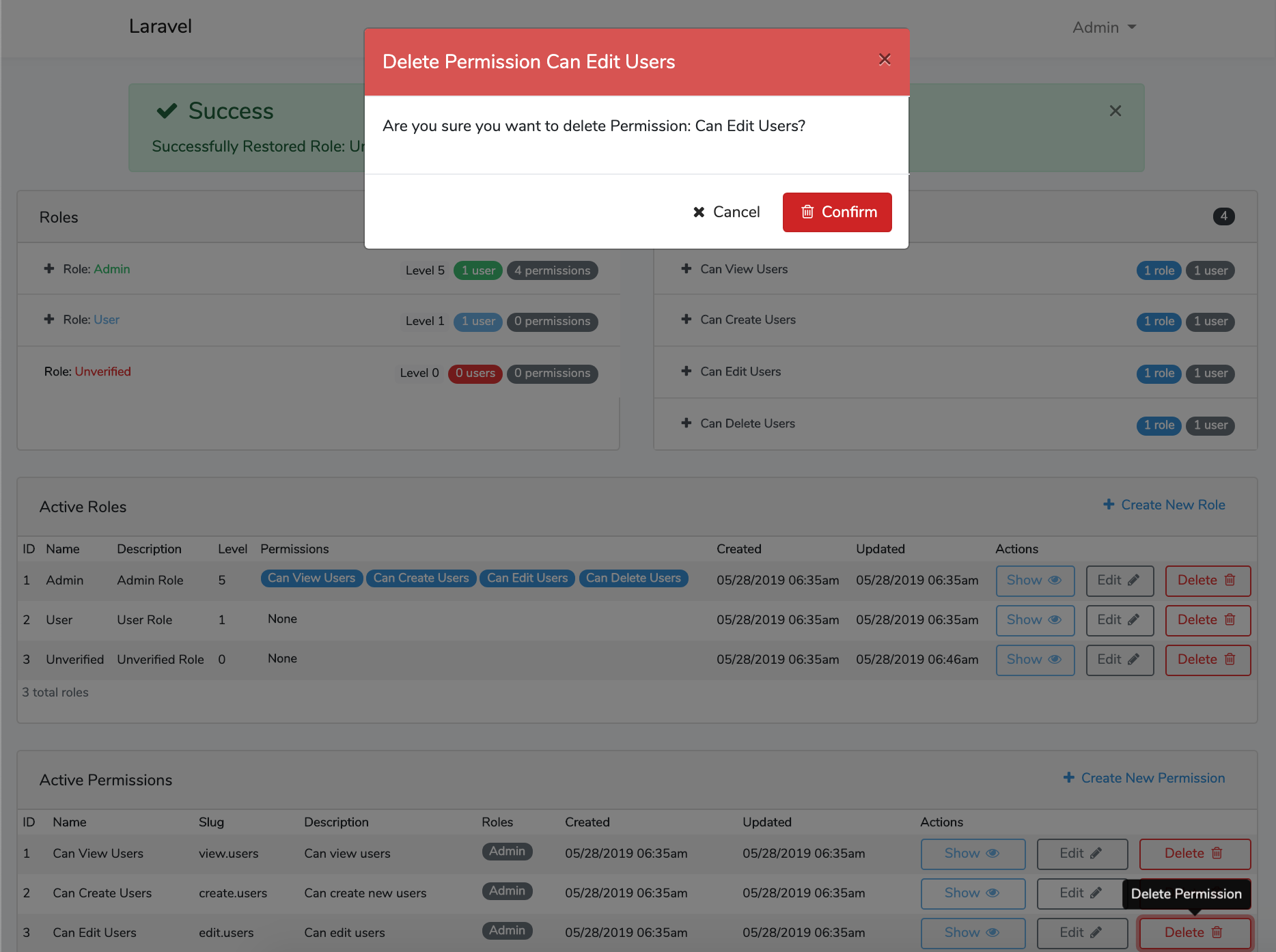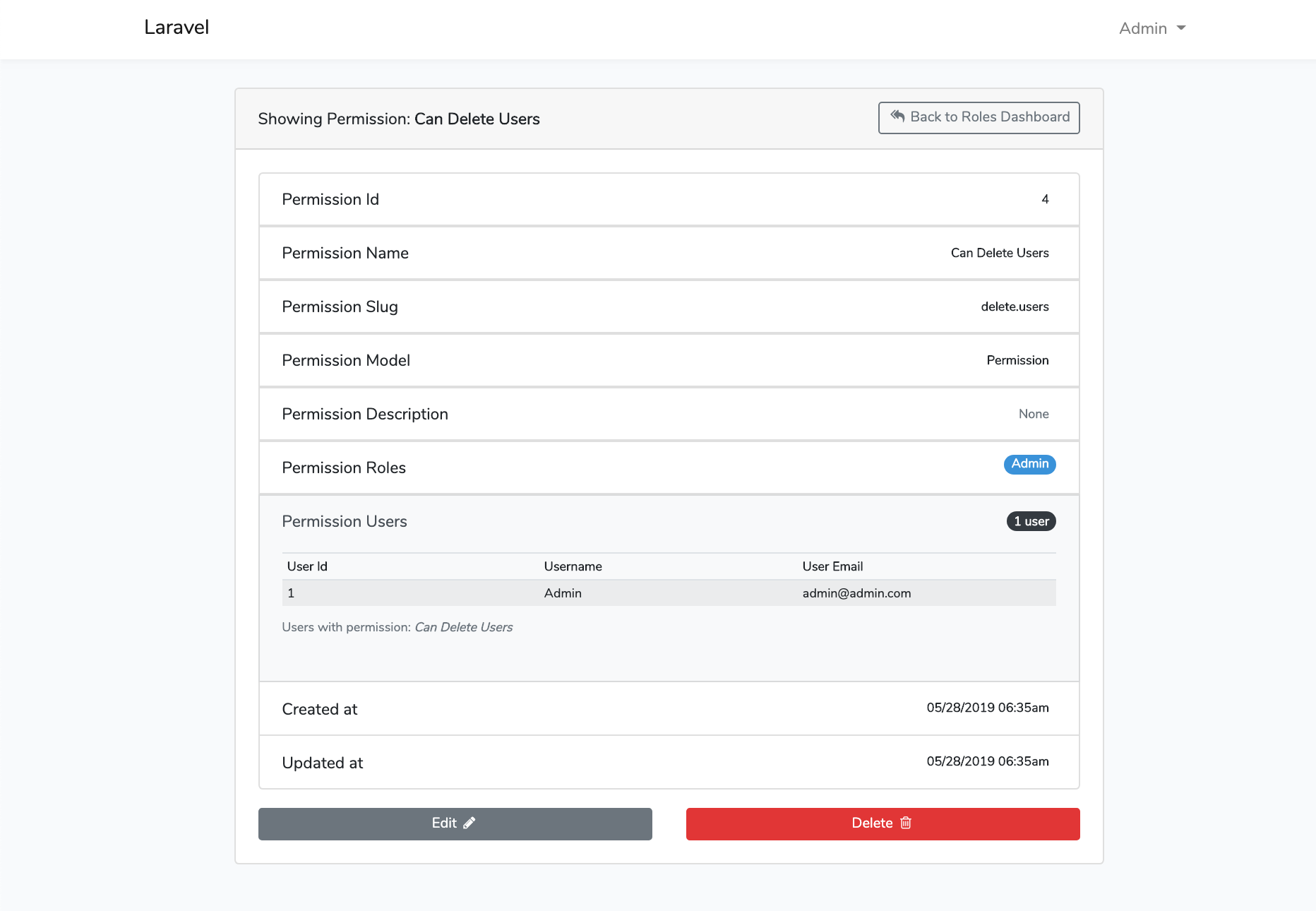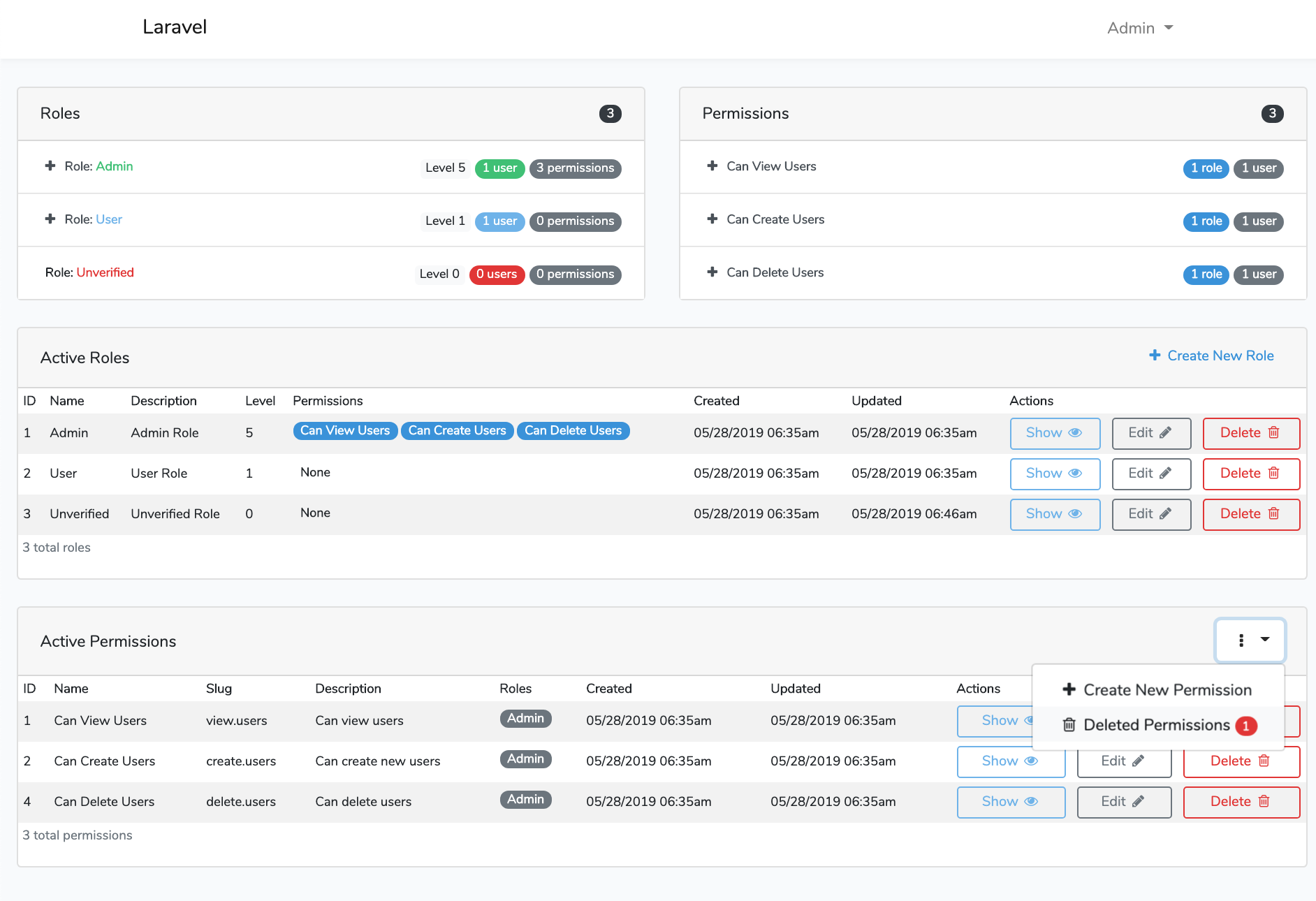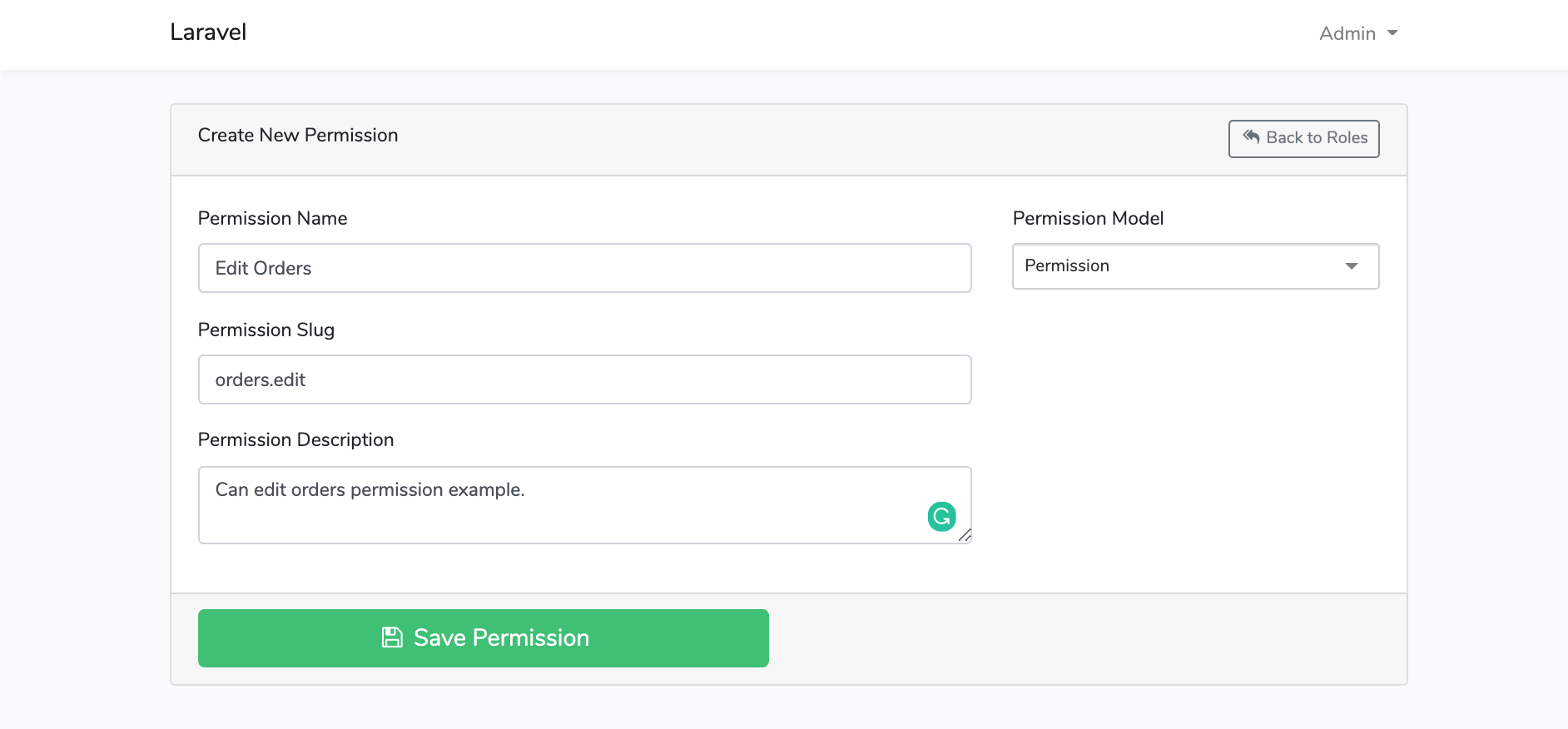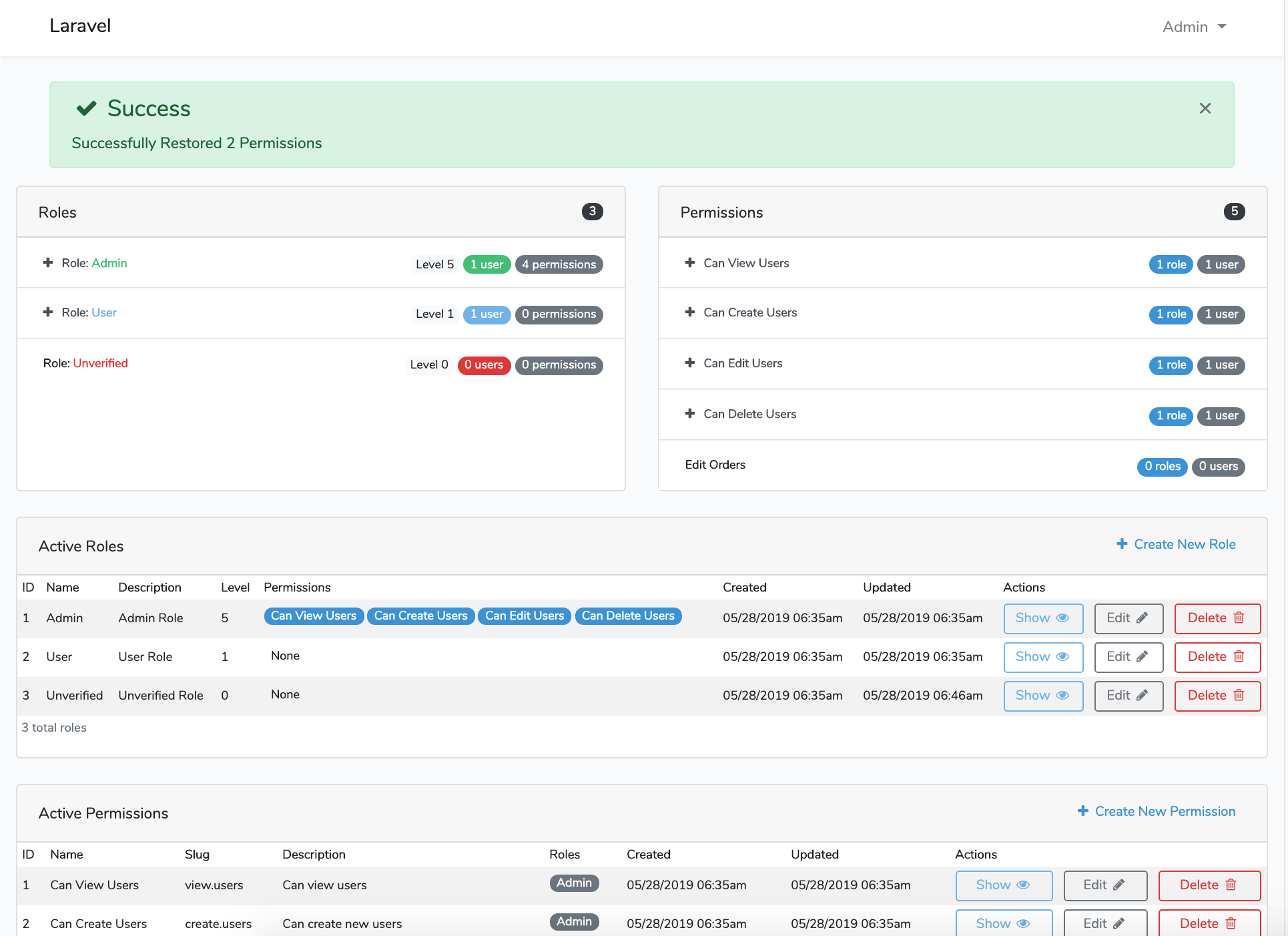A Powerful package for handling roles and permissions in Laravel. Supports Laravel 5.3, 5.4, 5.5, 5.6, 5.7, 5.8, 6.0, 7.0, and 8.0+.
- Features
- Installation
- Usage
- Configuration
- More Information
- Optional GUI Routes
- Screen Shots
- File Tree
- Opening an Issue
- License
| Laravel Roles Features |
|---|
| Built in migrations with ability to publish and modify your own. |
| Built in seed with ability to publish and modify your own. |
| Roles with levels and relationships to users, permissions |
| Permissions with relationships to users and levels |
| Soft deletes with full restore and destroy |
| Optional CRUD of Roles and Permissions |
| Lots of configuration options |
| All Extendable from .env |
This package is very easy to set up. There are only couple of steps.
From your projects root folder in terminal run:
Laravel 5.8 and up use:
composer require jeremykenedy/laravel-roles
Laravel 5.7 and below use:
composer require jeremykenedy/laravel-roles:1.4.0
- Note: The major difference is that Laravel's users table migration out the box changed from
$table->increments('id');to$table->bigIncrements('id');in Laravel 5.8.
-
Laravel 5.5 and up Uses package auto discovery feature, no need to edit the
config/app.phpfile. -
Laravel 5.4 and below Add the package to your application service providers in
config/app.phpfile.
'providers' => [
...
/**
* Third Party Service Providers...
*/
jeremykenedy\LaravelRoles\RolesServiceProvider::class,
], php artisan vendor:publish --tag=laravelroles php artisan vendor:publish --tag=laravelroles-config
php artisan vendor:publish --tag=laravelroles-migrations
php artisan vendor:publish --tag=laravelroles-seeds
php artisan vendor:publish --tag=laravelroles-views
php artisan vendor:publish --tag=laravelroles-lang-
Include
HasRoleAndPermissiontrait and also implementHasRoleAndPermissioncontract inside yourUsermodel. See example below. -
Include
use jeremykenedy\LaravelRoles\Traits\HasRoleAndPermission;in the top of yourUsermodel below the namespace and implement theHasRoleAndPermissiontrait. See example below.
Example User model Trait And Contract:
<?php
namespace App;
use Illuminate\Database\Eloquent\Model;
use Illuminate\Notifications\Notifiable;
use jeremykenedy\LaravelRoles\Traits\HasRoleAndPermission;
use Illuminate\Foundation\Auth\User as Authenticatable;
class User extends Authenticatable
{
use Notifiable;
use HasRoleAndPermission;
// rest of your model ...
}This uses the default users table which is in Laravel. You should already have the migration file for the users table available and migrated.
-
Setup the needed tables:
php artisan migrate -
Update
database\seeds\DatabaseSeeder.phpto include the seeds. See example below.
<?php
use Illuminate\Database\Seeder;
use Illuminate\Database\Eloquent\Model;
use Database\Seeders\PermissionsTableSeeder;
use Database\Seeders\RolesTableSeeder;
use Database\Seeders\ConnectRelationshipsSeeder;
class DatabaseSeeder extends Seeder
{
/**
* Run the database seeds.
*
* @return void
*/
public function run()
{
Model::unguard();
$this->call(PermissionsTableSeeder::class);
$this->call(RolesTableSeeder::class);
$this->call(ConnectRelationshipsSeeder::class);
//$this->call('UsersTableSeeder');
Model::reguard();
}
}- Seed an initial set of Permissions, Roles, and Users with roles.
composer dump-autoload
php artisan db:seed| Property | Value |
|---|---|
| Name | Admin |
| Slug | admin |
| Description | Admin Role |
| Level | 5 |
| Property | Value |
|---|---|
| Name | User |
| Slug | user |
| Description | User Role |
| Level | 1 |
| Property | Value |
|---|---|
| Name | Unverified |
| Slug | unverified |
| Description | Unverified Role |
| Level | 0 |
| Property | Value |
|---|---|
| name | Can View Users |
| slug | view.users |
| description | Can view users |
| model | Permission |
| Property | Value |
|---|---|
| name | Can Create Users |
| slug | create.users |
| description | Can create new users |
| model | Permission |
| Property | Value |
|---|---|
| name | Can Edit Users |
| slug | edit.users |
| description | Can edit users |
| model | Permission |
| Property | Value |
|---|---|
| name | Can Delete Users |
| slug | delete.users |
| description | Can delete users |
| model | Permission |
If you migrate from bican/roles to jeremykenedy/LaravelRoles you will need to update a few things.
- Change all calls to
can,canOneandcanAlltohasPermission,hasOnePermission,hasAllPermissions. - Change all calls to
is,isOneandisAlltohasRole,hasOneRole,hasAllRoles.
$adminRole = config('roles.models.role')::create([
'name' => 'Admin',
'slug' => 'admin',
'description' => '',
'level' => 5,
]);
$moderatorRole = config('roles.models.role')::create([
'name' => 'Forum Moderator',
'slug' => 'forum.moderator',
]);Because of
Slugabletrait, if you make a mistake and for example leave a space in slug parameter, it'll be replaced with a dot automatically, because ofstr_slugfunction.
It's really simple. You fetch a user from database and call attachRole method. There is BelongsToMany relationship between User and Role model.
$user = config('roles.models.defaultUser')::find($id);
$user->attachRole($adminRole); // you can pass whole object, or just an id
$user->detachRole($adminRole); // in case you want to detach role
$user->detachAllRoles(); // in case you want to detach all roles
$user->syncRoles($roles); // you can pass Eloquent collection, or just an array of idsYou can assign the user a role upon the users registration by updating the file app\Http\Controllers\Auth\RegisterController.php.
You can assign a role to a user upon registration by including the needed models and modifying the create() method to attach a user role. See example below:
- Updated
create()method ofapp\Http\Controllers\Auth\RegisterController.php:
protected function create(array $data)
{
$user = config('roles.models.defaultUser')::create([
'name' => $data['name'],
'email' => $data['email'],
'password' => bcrypt($data['password']),
]);
$role = config('roles.models.role')::where('name', '=', 'User')->first(); //choose the default role upon user creation.
$user->attachRole($role);
return $user;
}You can now check if the user has required role.
if ($user->hasRole('admin')) { // you can pass an id or slug
//
}You can also do this:
if ($user->isAdmin()) {
//
}And of course, there is a way to check for multiple roles:
if ($user->hasRole(['admin', 'moderator'])) {
/*
| Or alternatively:
| $user->hasRole('admin, moderator'), $user->hasRole('admin|moderator'),
| $user->hasOneRole('admin, moderator'), $user->hasOneRole(['admin', 'moderator']), $user->hasOneRole('admin|moderator')
*/
// The user has at least one of the roles
}
if ($user->hasRole(['admin', 'moderator'], true)) {
/*
| Or alternatively:
| $user->hasRole('admin, moderator', true), $user->hasRole('admin|moderator', true),
| $user->hasAllRoles('admin, moderator'), $user->hasAllRoles(['admin', 'moderator']), $user->hasAllRoles('admin|moderator')
*/
// The user has all roles
}When you are creating roles, there is optional parameter level. It is set to 1 by default, but you can overwrite it and then you can do something like this:
if ($user->level() > 4) {
//
}If user has multiple roles, method
levelreturns the highest one.
Level has also big effect on inheriting permissions. About it later.
It's very simple thanks to Permission model called from config('roles.models.permission').
$createUsersPermission = config('roles.models.permission')::create([
'name' => 'Create users',
'slug' => 'create.users',
'description' => '', // optional
]);
$deleteUsersPermission = config('roles.models.permission')::create([
'name' => 'Delete users',
'slug' => 'delete.users',
]);You can attach permissions to a role or directly to a specific user (and of course detach them as well).
$role = config('roles.models.role')::find($roleId);
$role->attachPermission($createUsersPermission); // permission attached to a role
$user = config('roles.models.defaultUser')::find($userId);
$user->attachPermission($deleteUsersPermission); // permission attached to a user$role->detachPermission($createUsersPermission); // in case you want to detach permission
$role->detachAllPermissions(); // in case you want to detach all permissions
$role->syncPermissions($permissions); // you can pass Eloquent collection, or just an array of ids
$user->detachPermission($deleteUsersPermission);
$user->detachAllPermissions();
$user->syncPermissions($permissions); // you can pass Eloquent collection, or just an array of idsif ($user->hasPermission('create.users')) { // you can pass an id or slug
//
}
if ($user->canDeleteUsers()) {
//
}You can check for multiple permissions the same way as roles. You can make use of additional methods like hasOnePermission or hasAllPermissions.
By default, roles with higher level inherit all permissions from roles with lower level.
For example:
You have three roles: user, moderator and admin. User has a permission to read articles, moderator can manage comments and admin can create articles. User has a level 1, moderator level 2 and admin level 3. With inheritance enabled, moderator and administrator also have the permission to read articles, and administrator can manage comments as well.
If you don't want the permissions inheritance feature enabled in you application, set the config value roles.inheritance (or its corresponding .env parameter, ROLES_INHERITANCE) to false. Alternatively, simply ignore the
levelparameter when you're creating roles.
Let's say you have an article and you want to edit it. This article belongs to a user (there is a column user_id in articles table).
use App\Article;
$editArticlesPermission = config('roles.models.permission')::create([
'name' => 'Edit articles',
'slug' => 'edit.articles',
'model' => 'App\Article',
]);
$user->attachPermission($editArticlesPermission);
$article = Article::find(1);
if ($user->allowed('edit.articles', $article)) { // $user->allowedEditArticles($article)
//
}This condition checks if the current user is the owner of article. If not, it will be looking inside user permissions for a row we created before.
if ($user->allowed('edit.articles', $article, false)) { // now owner check is disabled
//
}There are four Blade extensions. Basically, it is replacement for classic if statements.
@role('admin') // @if(Auth::check() && Auth::user()->hasRole('admin'))
// user has admin role
@endrole
@permission('edit.articles') // @if(Auth::check() && Auth::user()->hasPermission('edit.articles'))
// user has edit articles permissison
@endpermission
@level(2) // @if(Auth::check() && Auth::user()->level() >= 2)
// user has level 2 or higher
@endlevel
@allowed('edit', $article) // @if(Auth::check() && Auth::user()->allowed('edit', $article))
// show edit button
@endallowed
@role('admin|moderator', true) // @if(Auth::check() && Auth::user()->hasRole('admin|moderator', true))
// user has admin and moderator role
@else
// something else
@endroleThis package comes with VerifyRole, VerifyPermission and VerifyLevel middleware.
The middleware aliases are already registered in \jeremykenedy\LaravelRoles\RolesServiceProvider as of 1.7.
You can optionally add them inside your app/Http/Kernel.php file with your own aliases like outlined below:
/**
* The application's route middleware.
*
* @var array
*/
protected $routeMiddleware = [
'auth' => \App\Http\Middleware\Authenticate::class,
'auth.basic' => \Illuminate\Auth\Middleware\AuthenticateWithBasicAuth::class,
'bindings' => \Illuminate\Routing\Middleware\SubstituteBindings::class,
'cache.headers' => \Illuminate\Http\Middleware\SetCacheHeaders::class,
'can' => \Illuminate\Auth\Middleware\Authorize::class,
'guest' => \App\Http\Middleware\RedirectIfAuthenticated::class,
'signed' => \Illuminate\Routing\Middleware\ValidateSignature::class,
'throttle' => \Illuminate\Routing\Middleware\ThrottleRequests::class,
'verified' => \Illuminate\Auth\Middleware\EnsureEmailIsVerified::class,
'role' => \jeremykenedy\LaravelRoles\App\Http\Middleware\VerifyRole::class,
'permission' => \jeremykenedy\LaravelRoles\App\Http\Middleware\VerifyPermission::class,
'level' => \jeremykenedy\LaravelRoles\App\Http\Middleware\VerifyLevel::class,
];Now you can easily protect your routes.
Route::get('/', function () {
//
})->middleware('role:admin');
Route::get('/', function () {
//
})->middleware('permission:edit.articles');
Route::get('/', function () {
//
})->middleware('level:2'); // level >= 2
Route::get('/', function () {
//
})->middleware('role:admin', 'level:2'); // level >= 2 and Admin
Route::group(['middleware' => ['role:admin']], function () {
//
});It throws \jeremykenedy\LaravelRoles\App\Exceptions\RoleDeniedException, \jeremykenedy\LaravelRoles\App\Exceptions\PermissionDeniedException or \jeremykenedy\LaravelRoles\App\Exceptions\LevelDeniedException exceptions if it goes wrong.
You can catch these exceptions inside app/Exceptions/Handler.php file and do whatever you want.
/**
* Render an exception into an HTTP response.
*
* @param \Illuminate\Http\Request $request
* @param \Throwable $e
* @return \Illuminate\Http\Response
*/
public function render($request, Throwable $e)
{
$userLevelCheck = $e instanceof \jeremykenedy\LaravelRoles\App\Exceptions\RoleDeniedException ||
$e instanceof \jeremykenedy\LaravelRoles\App\Exceptions\PermissionDeniedException ||
$e instanceof \jeremykenedy\LaravelRoles\App\Exceptions\LevelDeniedException;
if ($userLevelCheck) {
if ($request->expectsJson()) {
return Response::json(array(
'error' => 403,
'message' => 'Unauthorized.'
), 403);
}
abort(403);
}
return parent::render($request, $e);
}- You can change connection for models, slug separator, models path and there is also a handy pretend feature.
- There are many configurable options which have been extended to be able to configured via
.envfile variables. - Editing the configuration file directly may not needed becuase of this.
- See config file: roles.php.
<?php
return [
/*
|--------------------------------------------------------------------------
| Package Connection
|--------------------------------------------------------------------------
|
| You can set a different database connection for this package. It will set
| new connection for models Role and Permission. When this option is null,
| it will connect to the main database, which is set up in database.php
|
*/
'connection' => env('ROLES_DATABASE_CONNECTION', null),
'rolesTable' => env('ROLES_ROLES_DATABASE_TABLE', 'roles'),
'roleUserTable' => env('ROLES_ROLE_USER_DATABASE_TABLE', 'role_user'),
'permissionsTable' => env('ROLES_PERMISSIONS_DATABASE_TABLE', 'permissions'),
'permissionsRoleTable' => env('ROLES_PERMISSION_ROLE_DATABASE_TABLE', 'permission_role'),
'permissionsUserTable' => env('ROLES_PERMISSION_USER_DATABASE_TABLE', 'permission_user'),
/*
|--------------------------------------------------------------------------
| Slug Separator
|--------------------------------------------------------------------------
|
| Here you can change the slug separator. This is very important in matter
| of magic method __call() and also a `Slugable` trait. The default value
| is a dot.
|
*/
'separator' => env('ROLES_DEFAULT_SEPARATOR', '.'),
/*
|--------------------------------------------------------------------------
| Models
|--------------------------------------------------------------------------
|
| If you want, you can replace default models from this package by models
| you created. Have a look at `jeremykenedy\LaravelRoles\Models\Role` model and
| `jeremykenedy\LaravelRoles\Models\Permission` model.
|
*/
'models' => [
'role' => env('ROLES_DEFAULT_ROLE_MODEL', jeremykenedy\LaravelRoles\Models\Role::class),
'permission' => env('ROLES_DEFAULT_PERMISSION_MODEL', jeremykenedy\LaravelRoles\Models\Permission::class),
'defaultUser' => env('ROLES_DEFAULT_USER_MODEL', config('auth.providers.users.model')),
],
/*
|--------------------------------------------------------------------------
| Roles, Permissions and Allowed "Pretend"
|--------------------------------------------------------------------------
|
| You can pretend or simulate package behavior no matter what is in your
| database. It is really useful when you are testing you application.
| Set up what will methods hasRole(), hasPermission() and allowed() return.
|
*/
'pretend' => [
'enabled' => false,
'options' => [
'hasRole' => true,
'hasPermission' => true,
'allowed' => true,
],
],
/*
|--------------------------------------------------------------------------
| Default Migrations
|--------------------------------------------------------------------------
|
| These are the default package migrations. If you publish the migrations
| to your project, then this is not necessary and should be disabled. This
| will enable our default migrations.
|
*/
'defaultMigrations' => [
'enabled' => env('ROLES_MIGRATION_DEFAULT_ENABLED', false),
],
/*
|--------------------------------------------------------------------------
| Default Seeds
|--------------------------------------------------------------------------
|
| These are the default package seeds. You can seed the package built
| in seeds without having to seed them. These seed directly from
| the package. These are not the published seeds.
|
*/
'defaultSeeds' => [
'PermissionsTableSeeder' => env('ROLES_SEED_DEFAULT_PERMISSIONS', true),
'RolesTableSeeder' => env('ROLES_SEED_DEFAULT_ROLES', true),
'ConnectRelationshipsSeeder' => env('ROLES_SEED_DEFAULT_RELATIONSHIPS', true),
'UsersTableSeeder' => env('ROLES_SEED_DEFAULT_USERS', false),
],
/*
|--------------------------------------------------------------------------
| Laravel Roles GUI Settings
|--------------------------------------------------------------------------
|
| This is the GUI for Laravel Roles to be able to CRUD them
| easily and fast. This is optional and is not needed
| for your application.
|
*/
// Enable Optional Roles Gui
'rolesGuiEnabled' => env('ROLES_GUI_ENABLED', false),
// Enable `auth` middleware
'rolesGuiAuthEnabled' => env('ROLES_GUI_AUTH_ENABLED', true),
// Enable Roles GUI middleware
'rolesGuiMiddlewareEnabled' => env('ROLES_GUI_MIDDLEWARE_ENABLED', true),
// Optional Roles GUI Middleware
'rolesGuiMiddleware' => env('ROLES_GUI_MIDDLEWARE', 'role:admin'),
// User Permissions or Role needed to create a new role
'rolesGuiCreateNewRolesMiddlewareType' => env('ROLES_GUI_CREATE_ROLE_MIDDLEWARE_TYPE', 'role'), //permissions or roles
'rolesGuiCreateNewRolesMiddleware' => env('ROLES_GUI_CREATE_ROLE_MIDDLEWARE_TYPE', 'admin'), // admin, XXX. ... or perms.XXX
// User Permissions or Role needed to create a new permission
'rolesGuiCreateNewPermissionMiddlewareType' => env('ROLES_GUI_CREATE_PERMISSION_MIDDLEWARE_TYPE', 'role'), //permissions or roles
'rolesGuiCreateNewPermissionsMiddleware' => env('ROLES_GUI_CREATE_PERMISSION_MIDDLEWARE_TYPE', 'admin'), // admin, XXX. ... or perms.XXX
// The parent blade file
'bladeExtended' => env('ROLES_GUI_BLADE_EXTENDED', 'layouts.app'),
// Blade Extension Placement
'bladePlacement' => env('ROLES_GUI_BLADE_PLACEMENT', 'yield'),
'bladePlacementCss' => env('ROLES_GUI_BLADE_PLACEMENT_CSS', 'inline_template_linked_css'),
'bladePlacementJs' => env('ROLES_GUI_BLADE_PLACEMENT_JS', 'inline_footer_scripts'),
// Titles placement extend
'titleExtended' => env('ROLES_GUI_TITLE_EXTENDED', 'template_title'),
// Switch Between bootstrap 3 `panel` and bootstrap 4 `card` classes
'bootstapVersion' => env('ROLES_GUI_BOOTSTRAP_VERSION', '4'),
// Additional Card classes for styling -
// See: https://getbootstrap.com/docs/4.0/components/card/#background-and-color
// Example classes: 'text-white bg-primary mb-3'
'bootstrapCardClasses' => env('ROLES_GUI_CARD_CLASSES', ''),
// Bootstrap Tooltips
'tooltipsEnabled' => env('ROLES_GUI_TOOLTIPS_ENABLED', true),
// jQuery
'enablejQueryCDN' => env('ROLES_GUI_JQUERY_CDN_ENABLED', true),
'JQueryCDN' => env('ROLES_GUI_JQUERY_CDN_URL', 'https://code.jquery.com/jquery-3.3.1.min.js'),
// Selectize JS
'enableSelectizeJsCDN' => env('ROLES_GUI_SELECTIZEJS_CDN_ENABLED', true),
'SelectizeJsCDN' => env('ROLES_GUI_SELECTIZEJS_CDN_URL', 'https://cdnjs.cloudflare.com/ajax/libs/selectize.js/0.12.6/js/standalone/selectize.min.js'),
'enableSelectizeJs' => env('ROLES_GUI_SELECTIZEJS_ENABLED', true),
'enableSelectizeJsCssCDN' => env('ROLES_GUI_SELECTIZEJS_CSS_CDN_ENABLED', true),
'SelectizeJsCssCDN' => env('ROLES_GUI_SELECTIZEJS_CSS_CDN_URL', 'https://cdnjs.cloudflare.com/ajax/libs/selectize.js/0.12.6/css/selectize.min.css'),
// Font Awesome
'enableFontAwesomeCDN' => env('ROLES_GUI_FONT_AWESOME_CDN_ENABLED', true),
'fontAwesomeCDN' => env('ROLES_GUI_FONT_AWESOME_CDN_URL', 'https://maxcdn.bootstrapcdn.com/font-awesome/4.7.0/css/font-awesome.min.css'),
// Flash Messaging
'builtInFlashMessagesEnabled' => env('ROLES_GUI_FLASH_MESSAGES_ENABLED', true),
/*
|--------------------------------------------------------------------------
| Laravel Roles API Settings
|--------------------------------------------------------------------------
|
| This is the API for Laravel Roles to be able to CRUD them
| easily and fast via an API. This is optional and is
| not needed for your application.
|
*/
'rolesApiEnabled' => env('ROLES_API_ENABLED', false),
// Enable `auth` middleware
'rolesAPIAuthEnabled' => env('ROLES_API_AUTH_ENABLED', true),
// Enable Roles API middleware
'rolesAPIMiddlewareEnabled' => env('ROLES_API_MIDDLEWARE_ENABLED', true),
// Optional Roles API Middleware
'rolesAPIMiddleware' => env('ROLES_API_MIDDLEWARE', 'role:admin'),
// User Permissions or Role needed to create a new role
'rolesAPICreateNewRolesMiddlewareType' => env('ROLES_API_CREATE_ROLE_MIDDLEWARE_TYPE', 'role'), //permissions or roles
'rolesAPICreateNewRolesMiddleware' => env('ROLES_API_CREATE_ROLE_MIDDLEWARE_TYPE', 'admin'), // admin, XXX. ... or perms.XXX
// User Permissions or Role needed to create a new permission
'rolesAPICreateNewPermissionMiddlewareType' => env('ROLES_API_CREATE_PERMISSION_MIDDLEWARE_TYPE', 'role'), //permissions or roles
'rolesAPICreateNewPermissionsMiddleware' => env('ROLES_API_CREATE_PERMISSION_MIDDLEWARE_TYPE', 'admin'), // admin, XXX. ... or perms.XXX
/*
|--------------------------------------------------------------------------
| Laravel Roles GUI Datatables Settings
|--------------------------------------------------------------------------
*/
'enabledDatatablesJs' => env('ROLES_GUI_DATATABLES_JS_ENABLED', false),
'datatablesJsStartCount' => env('ROLES_GUI_DATATABLES_JS_START_COUNT', 25),
'datatablesCssCDN' => env('ROLES_GUI_DATATABLES_CSS_CDN', 'https://cdn.datatables.net/1.10.19/css/dataTables.bootstrap4.min.css'),
'datatablesJsCDN' => env('ROLES_GUI_DATATABLES_JS_CDN', 'https://cdn.datatables.net/1.10.19/js/jquery.dataTables.min.js'),
'datatablesJsPresetCDN' => env('ROLES_GUI_DATATABLES_JS_PRESET_CDN', 'https://cdn.datatables.net/1.10.19/js/dataTables.bootstrap4.min.js'),
/*
|--------------------------------------------------------------------------
| Laravel Roles Package Integration Settings
|--------------------------------------------------------------------------
*/
'laravelUsersEnabled' => env('ROLES_GUI_LARAVEL_ROLES_ENABLED', false),
];
# Roles Default Models
ROLES_DEFAULT_USER_MODEL=App\User
ROLES_DEFAULT_ROLE_MODEL=jeremykenedy\LaravelRoles\Models\Role
ROLES_DEFAULT_PERMISSION_MODEL=jeremykenedy\LaravelRoles\Models\Permission
# Roles database information
ROLES_DATABASE_CONNECTION=null
ROLES_ROLES_DATABASE_TABLE=roles
ROLES_ROLE_USER_DATABASE_TABLE=role_user
ROLES_PERMISSIONS_DATABASE_TABLE=permissions
ROLES_PERMISSION_ROLE_DATABASE_TABLE=permission_role
ROLES_PERMISSION_USER_DATABASE_TABLE=permission_user
# Roles Misc Settings
ROLES_DEFAULT_SEPARATOR='.'
# Roles Database Migrations Settings
ROLES_MIGRATION_DEFAULT_ENABLED=true
# Roles Database Seeder Settings
ROLES_SEED_DEFAULT_PERMISSIONS=true
ROLES_SEED_DEFAULT_ROLES=true
ROLES_SEED_DEFAULT_RELATIONSHIPS=true
ROLES_SEED_DEFAULT_USERS=false
# Roles GUI Settings
ROLES_GUI_ENABLED=false
ROLES_GUI_AUTH_ENABLED=true
ROLES_GUI_MIDDLEWARE_ENABLED=true
ROLES_GUI_MIDDLEWARE='role:admin'
ROLES_GUI_CREATE_ROLE_MIDDLEWARE_TYPE='role'
ROLES_GUI_CREATE_ROLE_MIDDLEWARE_TYPE='admin'
ROLES_GUI_CREATE_PERMISSION_MIDDLEWARE_TYPE='role'
ROLES_GUI_CREATE_PERMISSION_MIDDLEWARE_TYPE='admin'
ROLES_GUI_BLADE_EXTENDED='layouts.app'
ROLES_GUI_TITLE_EXTENDED='template_title'
ROLES_GUI_LARAVEL_ROLES_ENABLED=false
ROLES_GUI_TOOLTIPS_ENABLED=true
ROLES_GUI_DATATABLES_JS_ENABLED=false
For more information, please have a look at HasRoleAndPermission contract.
+--------+-----------+---------------------------------+-----------------------------------------------+-----------------------------------------------------------------------------------------------------------------+---------------------+
| Domain | Method | URI | Name | Action | Middleware |
+--------+-----------+---------------------------------+-----------------------------------------------+-----------------------------------------------------------------------------------------------------------------+---------------------+
| | GET|HEAD | permission-deleted/{id} | laravelroles::permission-show-deleted | jeremykenedy\LaravelRoles\App\Http\Controllers\LaravelpermissionsDeletedController@show | web,auth,role:admin |
| | DELETE | permission-destroy/{id} | laravelroles::permission-item-destroy | jeremykenedy\LaravelRoles\App\Http\Controllers\LaravelpermissionsDeletedController@destroy | web,auth,role:admin |
| | PUT | permission-restore/{id} | laravelroles::permission-restore | jeremykenedy\LaravelRoles\App\Http\Controllers\LaravelpermissionsDeletedController@restorePermission | web,auth,role:admin |
| | POST | permissions | laravelroles::permissions.store | jeremykenedy\LaravelRoles\App\Http\Controllers\LaravelPermissionsController@store | web,auth,role:admin |
| | GET|HEAD | permissions | laravelroles::permissions.index | jeremykenedy\LaravelRoles\App\Http\Controllers\LaravelPermissionsController@index | web,auth,role:admin |
| | GET|HEAD | permissions-deleted | laravelroles::permissions-deleted | jeremykenedy\LaravelRoles\App\Http\Controllers\LaravelpermissionsDeletedController@index | web,auth,role:admin |
| | DELETE | permissions-deleted-destroy-all | laravelroles::destroy-all-deleted-permissions | jeremykenedy\LaravelRoles\App\Http\Controllers\LaravelpermissionsDeletedController@destroyAllDeletedPermissions | web,auth,role:admin |
| | POST | permissions-deleted-restore-all | laravelroles::permissions-deleted-restore-all | jeremykenedy\LaravelRoles\App\Http\Controllers\LaravelpermissionsDeletedController@restoreAllDeletedPermissions | web,auth,role:admin |
| | GET|HEAD | permissions/create | laravelroles::permissions.create | jeremykenedy\LaravelRoles\App\Http\Controllers\LaravelPermissionsController@create | web,auth,role:admin |
| | PUT|PATCH | permissions/{permission} | laravelroles::permissions.update | jeremykenedy\LaravelRoles\App\Http\Controllers\LaravelPermissionsController@update | web,auth,role:admin |
| | GET|HEAD | permissions/{permission} | laravelroles::permissions.show | jeremykenedy\LaravelRoles\App\Http\Controllers\LaravelPermissionsController@show | web,auth,role:admin |
| | DELETE | permissions/{permission} | laravelroles::permissions.destroy | jeremykenedy\LaravelRoles\App\Http\Controllers\LaravelPermissionsController@destroy | web,auth,role:admin |
| | GET|HEAD | permissions/{permission}/edit | laravelroles::permissions.edit | jeremykenedy\LaravelRoles\App\Http\Controllers\LaravelPermissionsController@edit | web,auth,role:admin |
| | GET|HEAD | role-deleted/{id} | laravelroles::role-show-deleted | jeremykenedy\LaravelRoles\App\Http\Controllers\LaravelRolesDeletedController@show | web,auth,role:admin |
| | DELETE | role-destroy/{id} | laravelroles::role-item-destroy | jeremykenedy\LaravelRoles\App\Http\Controllers\LaravelRolesDeletedController@destroy | web,auth,role:admin |
| | PUT | role-restore/{id} | laravelroles::role-restore | jeremykenedy\LaravelRoles\App\Http\Controllers\LaravelRolesDeletedController@restoreRole | web,auth,role:admin |
| | POST | roles | laravelroles::roles.store | jeremykenedy\LaravelRoles\App\Http\Controllers\LaravelRolesController@store | web,auth,role:admin |
| | GET|HEAD | roles | laravelroles::roles.index | jeremykenedy\LaravelRoles\App\Http\Controllers\LaravelRolesController@index | web,auth,role:admin |
| | GET|HEAD | roles-deleted | laravelroles::roles-deleted | jeremykenedy\LaravelRoles\App\Http\Controllers\LaravelRolesDeletedController@index | web,auth,role:admin |
| | DELETE | roles-deleted-destroy-all | laravelroles::destroy-all-deleted-roles | jeremykenedy\LaravelRoles\App\Http\Controllers\LaravelRolesDeletedController@destroyAllDeletedRoles | web,auth,role:admin |
| | POST | roles-deleted-restore-all | laravelroles::roles-deleted-restore-all | jeremykenedy\LaravelRoles\App\Http\Controllers\LaravelRolesDeletedController@restoreAllDeletedRoles | web,auth,role:admin |
| | GET|HEAD | roles/create | laravelroles::roles.create | jeremykenedy\LaravelRoles\App\Http\Controllers\LaravelRolesController@create | web,auth,role:admin |
| | DELETE | roles/{role} | laravelroles::roles.destroy | jeremykenedy\LaravelRoles\App\Http\Controllers\LaravelRolesController@destroy | web,auth,role:admin |
| | PUT|PATCH | roles/{role} | laravelroles::roles.update | jeremykenedy\LaravelRoles\App\Http\Controllers\LaravelRolesController@update | web,auth,role:admin |
| | GET|HEAD | roles/{role} | laravelroles::roles.show | jeremykenedy\LaravelRoles\App\Http\Controllers\LaravelRolesController@show | web,auth,role:admin |
| | GET|HEAD | roles/{role}/edit | laravelroles::roles.edit | jeremykenedy\LaravelRoles\App\Http\Controllers\LaravelRolesController@edit | web,auth,role:admin |
+--------+-----------+---------------------------------+-----------------------------------------------+-----------------------------------------------------------------------------------------------------------------+---------------------+
├── .env.example
├── .env.travis
├── .gitignore
├── .travis.yml
├── LICENSE
├── composer.json
├── phpunit.xml
├── readme.md
└── src
├── App
│ ├── Exceptions
│ │ ├── AccessDeniedException.php
│ │ ├── LevelDeniedException.php
│ │ ├── PermissionDeniedException.php
│ │ └── RoleDeniedException.php
│ ├── Http
│ │ ├── Controllers
│ │ │ ├── Api
│ │ │ │ └── LaravelRolesApiController.php
│ │ │ ├── LaravelPermissionsController.php
│ │ │ ├── LaravelRolesController.php
│ │ │ ├── LaravelRolesDeletedController.php
│ │ │ └── LaravelpermissionsDeletedController.php
│ │ ├── Middleware
│ │ │ ├── VerifyLevel.php
│ │ │ ├── VerifyPermission.php
│ │ │ └── VerifyRole.php
│ │ └── Requests
│ │ ├── StorePermissionRequest.php
│ │ ├── StoreRoleRequest.php
│ │ ├── UpdatePermissionRequest.php
│ │ └── UpdateRoleRequest.php
│ └── Services
│ ├── PermissionFormFields.php
│ └── RoleFormFields.php
├── Contracts
│ ├── HasRoleAndPermission.php
│ ├── PermissionHasRelations.php
│ └── RoleHasRelations.php
├── Models
│ ├── Permission.php
│ └── Role.php
├── RolesFacade.php
├── RolesServiceProvider.php
├── Traits
│ ├── DatabaseTraits.php
│ ├── HasRoleAndPermission.php
│ ├── PermissionHasRelations.php
│ ├── RoleHasRelations.php
│ ├── RolesAndPermissionsHelpersTrait.php
│ ├── RolesUsageAuthTrait.php
│ └── Slugable.php
├── config
│ └── roles.php
├── database
│ ├── Migrations
│ │ ├── 2016_01_15_105324_create_roles_table.php
│ │ ├── 2016_01_15_114412_create_role_user_table.php
│ │ ├── 2016_01_26_115212_create_permissions_table.php
│ │ ├── 2016_01_26_115523_create_permission_role_table.php
│ │ └── 2016_02_09_132439_create_permission_user_table.php
│ └── Seeds
│ ├── DefaultConnectRelationshipsSeeder.php
│ ├── DefaultPermissionsTableSeeder.php
│ ├── DefaultRolesTableSeeder.php
│ ├── DefaultUsersTableSeeder.php
│ └── publish
│ ├── ConnectRelationshipsSeeder.php
│ ├── PermissionsTableSeeder.php
│ ├── RolesTableSeeder.php
│ └── UsersTableSeeder.php
├── resources
│ ├── lang
│ │ └── en
│ │ └── laravelroles.php
│ └── views
│ └── laravelroles
│ ├── cards
│ │ ├── permissions-card.blade.php
│ │ └── roles-card.blade.php
│ ├── crud
│ │ ├── dashboard.blade.php
│ │ ├── permissions
│ │ │ ├── create.blade.php
│ │ │ ├── deleted
│ │ │ │ └── index.blade.php
│ │ │ ├── edit.blade.php
│ │ │ └── show.blade.php
│ │ └── roles
│ │ ├── create.blade.php
│ │ ├── deleted
│ │ │ └── index.blade.php
│ │ ├── edit.blade.php
│ │ └── show.blade.php
│ ├── forms
│ │ ├── create-permission-form.blade.php
│ │ ├── create-role-form.blade.php
│ │ ├── delete-sm.blade.php
│ │ ├── destroy-all-permissions.blade.php
│ │ ├── destroy-all-roles.blade.php
│ │ ├── destroy-sm.blade.php
│ │ ├── edit-permission-form.blade.php
│ │ ├── edit-role-form.blade.php
│ │ ├── partials
│ │ │ ├── permission-desc-input.blade.php
│ │ │ ├── permission-name-input.blade.php
│ │ │ ├── permission-slug-input.blade.php
│ │ │ ├── permissions-model-select.blade.php
│ │ │ ├── role-desc-input.blade.php
│ │ │ ├── role-level-input.blade.php
│ │ │ ├── role-name-input.blade.php
│ │ │ ├── role-permissions-select.blade.php
│ │ │ └── role-slug-input.blade.php
│ │ ├── permission-form.blade.php
│ │ ├── restore-all-permissions.blade.php
│ │ ├── restore-all-roles.blade.php
│ │ ├── restore-item.blade.php
│ │ └── role-form.blade.php
│ ├── modals
│ │ └── confirm-modal.blade.php
│ ├── partials
│ │ ├── bs-visibility-css.blade.php
│ │ ├── flash-messages.blade.php
│ │ ├── form-status.blade.php
│ │ └── styles.blade.php
│ ├── scripts
│ │ ├── confirm-modal.blade.php
│ │ ├── datatables.blade.php
│ │ ├── form-inputs-helpers.blade.php
│ │ ├── selectize.blade.php
│ │ ├── selectizePermission.blade.php
│ │ └── tooltips.blade.php
│ └── tables
│ ├── permission-items-table.blade.php
│ ├── permissions-table.blade.php
│ ├── role-items-table.blade.php
│ └── roles-table.blade.php
└── routes
├── api.php
└── web.php- Tree command can be installed using brew:
brew install tree - File tree generated using command
tree -a -I '.git|node_modules|vendor|storage|tests'
Before opening an issue there are a couple of considerations:
- You are all awesome!
- Read the instructions and make sure all steps were followed correctly.
- Check that the issue is not specific to your development environment setup.
- Provide duplication steps.
- Attempt to look into the issue, and if you have a solution, make a pull request.
- Show that you have made an attempt to look into the issue.
- Check to see if the issue you are reporting is a duplicate of a previous reported issue.
- Following these instructions show me that you have tried.
- If you have a questions send me an email to jeremykenedy@gmail.com
- Need some help, I can do my best on Slack: https://opensourcehelpgroup.slack.com
- Please be considerate that this is an open source project that I provide to the community for FREE when opening an issue.
The HasRoleAndPermission Trait And Contract is and an adaptation of romanbican/roles. I liked the method he made so I used them.
This package is free software distributed under the terms of the MIT license. Enjoy!




